
"The Crystal Crypt" is a science fiction short story by American writer Philip K. Dick, [1] first published in the January 1954 edition of Planet Stories and later published in Beyond Lies the Wub in 1988.

"The Crystal Crypt" is a science fiction short story by American writer Philip K. Dick, [1] first published in the January 1954 edition of Planet Stories and later published in Beyond Lies the Wub in 1988.
The story is set in the distant future where Earth and Mars are on the verge of war. The last spaceship to leave Mars [1] headed for Earth is stopped and searched by Martian soldiers, who are looking for three saboteurs who destroyed a Martian city. [2] They are not found, and the ship continues towards Earth. On board the space ship, a business man by the name of Thacher meets a young woman and two men, who tell that they are the people sought by the Martians, and proceed to tell Thacher the story of how they did not destroy the Martian city, but used a device to reduce the entire city to fit in a tiny globe, which they smuggled on board the ship. The city is to be used as a bargaining chip against Mars in the upcoming war. Thacher reveals that he is a Martian secret agent, and several of the passengers on board are Martian police.
The Crystal Crypt is in the public domain in the United States since its original copyright was not renewed with the US Copyright Office on the 27th year after the initial copyright expired. The Crystal Crypt is therefore freely available to read and download online. [3]
A short film adaptation of The Crystal Crypt, starring Yuri Lowenthal, Cyrus Zoghi, and Tara Platt, [2] [4] was released in December 2013.
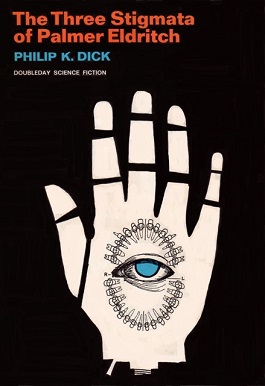
The Three Stigmata of Palmer Eldritch is a 1964 science fiction novel by American writer Philip K. Dick. It was nominated for the Nebula Award for Best Novel in 1965. Like many of Dick's novels, it utilizes an array of science fiction concepts and explores the ambiguous slippage between reality and unreality. It is one of Dick's first works to explore religious themes.

The Martian Chronicles is a science fiction fix-up novel, published in 1950, by American writer Ray Bradbury that chronicles the exploration and settlement of Mars, the home of indigenous Martians, by Americans leaving a troubled Earth that is eventually devastated by nuclear war.
"Second Variety" is a science fiction novelette by American writer Philip K. Dick, first published in Space Science Fiction magazine, in May 1953. Set in a world where war between the Soviet Union and United Nations has reduced most of the world to a barren wasteland, the story concerns the discovery, by the few remaining soldiers left, that self-replicating robots originally built to assassinate Soviet agents have gained sentience and are now plotting against both sides. It is one of many stories by Dick examining the implications of nuclear war, particularly after it has destroyed much or all of the planet.
"The Variable Man" is a science fiction novella by American writer Philip K. Dick, which he wrote and sold before he had an agent. It was first published in the British magazine Space Science Fiction Vol. 2 No. 2, July 1953, and in the American version on September 1953, with the US publication illustrated by Alex Ebel. Despite the magazine cover dates it is unclear whether the first publication was in the UK or in the United States where magazines tended to be published farther ahead of their cover dates than in the UK. The Variable Man can be found in several collections of Dick's short stories, including The Variable Man and The Short Happy Life of the Brown Oxford.
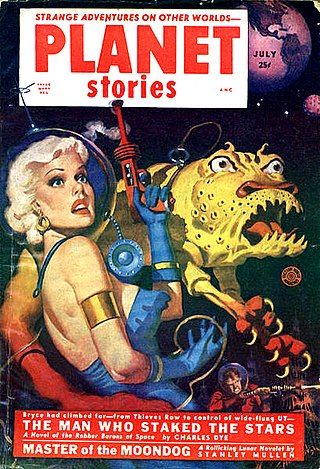
"Beyond Lies the Wub" is a science fiction short story by American writer Philip K. Dick. It was his first published genre story, originally appearing in Planet Stories in July 1952. It was first collected in The Preserving Machine in 1969, and was included in The Best of Philip K. Dick in 1977. It was the title story for the first volume of the original edition of Dick's collected stories. Translations of "Beyond Lies the Wub" have appeared in Dutch, French, German, Italian, Polish and Spanish; and the story has been included in more than a dozen anthologies.
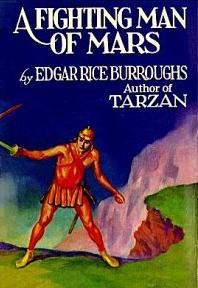
A Fighting Man of Mars is a science fantasy novel by American writer Edgar Rice Burroughs, the seventh of his Barsoom series. Burroughs began writing it on February 28, 1929, and the finished story was first published in The Blue Book Magazine as a six-part serial in the issues for April to September 1930. It was later published as a complete novel by Metropolitan in May 1931.

A Princess of Mars is a science fantasy novel by American writer Edgar Rice Burroughs, the first of his Barsoom series. It was first serialized in the pulp magazine All-Story Magazine from February–July, 1912. Full of swordplay and daring feats, the novel is considered a classic example of 20th-century pulp fiction. It is also a seminal instance of the planetary romance, a subgenre of science fantasy that became highly popular in the decades following its publication. Its early chapters also contain elements of the Western. The story is set on Mars, imagined as a dying planet with a harsh desert environment. This vision of Mars was based on the work of the astronomer Percival Lowell, whose ideas were widely popularized in the late 19th and early 20th centuries.

"The Defenders" is a 1953 science fiction novelette by American author Philip K. Dick, and the basis for Dick's 1964 novel The Penultimate Truth. It is one of several of his stories to be expanded into a novel. The story was first published in the January 1953 issue of Galaxy Science Fiction.

Raymond Fisher Jones was an American science fiction author. He is best known for his 1952 novel This Island Earth, which was adapted into the eponymous 1955 film.
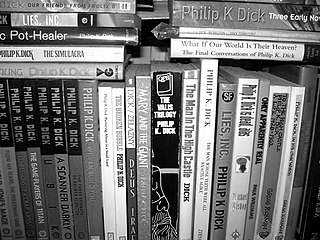
The bibliography of Philip K. Dick includes 44 novels, 121 short stories, and 14 short story collections published by American science fiction author Philip K. Dick during his lifetime.

"A Martian Odyssey" is a science fiction short story by American writer Stanley G. Weinbaum originally published in the July 1934 issue of Wonder Stories. It was Weinbaum's second published story, and remains his best known. It was followed four months later by a sequel, "Valley of Dreams". These are the only stories by Weinbaum set on Mars.
"Valley of Dreams" is a science fiction short story by the American writer Stanley G. Weinbaum, originally published in the November 1934 issue of Wonder Stories. It was Weinbaum's second published story and is a sequel to his first story, "A Martian Odyssey".

"The Crystal Egg" is a science fiction short story written by H. G. Wells in 1897.

Edison's Conquest of Mars is an 1898 science fiction novel by American astronomer and writer Garrett P. Serviss. It was written as a sequel to Fighters from Mars, an unauthorized and heavily altered version of H. G. Wells's 1897 story The War of the Worlds. It has a place in the history of science fiction for its early employment of themes and motifs that later became staples of the genre.

The Collected Stories of Philip K. Dick is a collection of 118 science fiction stories by American writer Philip K. Dick. It was first published by Underwood-Miller in 1987 as a five volume set. See Philip K. Dick bibliography for information about the mass market reprints.
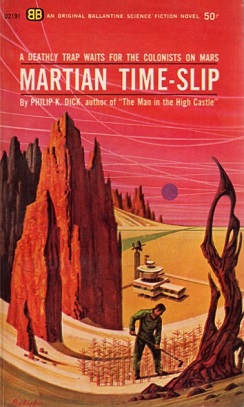
Martian Time-Slip is a 1964 science fiction novel by American writer Philip K. Dick. The novel uses the common science fiction concept of a human colony on Mars. However, it also includes the themes of mental illness, the physics of time and the dangers of centralized authority.
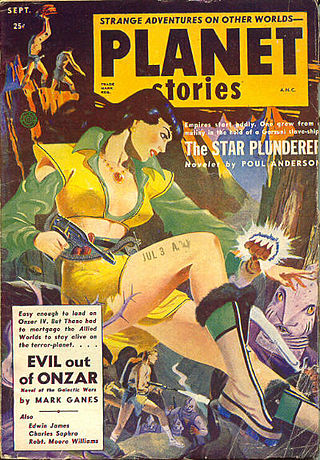
"The Gun" is a science fiction short story by American writer Philip K. Dick, first published in 1952 September issue of Planet Stories, and later published in Beyond Lies the Wub in 1984. "The Gun" has been published in Italian, German, French and Polish translations.

"The Skull" is a science fiction short story by American writer Philip K. Dick, first published in 1952 in If, and later in The Collected Stories of Philip K. Dick. It has since been republished several times, including in Beyond Lies the Wub in 1988.

"Mr. Spaceship" is a science fiction short story by American writer Philip K. Dick, first published in Imagination in January 1953, and later in The Collected Stories of Philip K. Dick. It has since been republished several times, including in Beyond Lies the Wub in 1988.

"Piper in the Woods" is a science fiction short story by American writer Philip K. Dick, first published in 1953 in Imagination, and later in The Collected Stories of Philip K. Dick. It has since been republished several times, including in Beyond Lies the Wub in 1988.